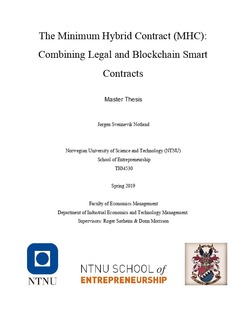| dc.contributor.advisor | Røger Sørheim | |
| dc.contributor.advisor | Donn Morrison | |
| dc.contributor.author | Jørgen Svennevik Notland | |
| dc.date.accessioned | 2019-10-31T15:21:00Z | |
| dc.date.available | 2019-10-31T15:21:00Z | |
| dc.date.issued | 2019 | |
| dc.identifier.uri | http://hdl.handle.net/11250/2625939 | |
| dc.description.abstract | Etter å ha identifisert kontrakter som korrupsjonsnekke, har jeg forsøkt å finne kontakter, blokkere smarte kontrakter, og økonomiske regler kan brukes til å gjøre dem både sikre, ansvarlige, transparente og inkluderende. Da undersøkte jeg hvordan et kontraktsforhold kunne reduseres ved å bruke begrepet Minimum Hybrid Contract (MHC), som jeg har inngått, hvor en smart kontrakt er et supplement til en juridisk kontrakt som gir åpenhet og uendelighet til kontraktens finansielle transaksjoner, er personvern akseptert. som et menneskelig behov og total åpenhet må unngås.
Nøkkel litteratur gjennomgang på blockchain forklarer sine hovedtrekk for finansiell transaksjon; gjennomsiktighet og uforanderlighet. Blockchain smarte kontrakter kan samhandle med, eller erstatte juridisk kontrakt, og redusere byråsteoriproblemer som øker tilliten til rektor-agent-forholdet. MHC er en evolusjonær forandring i proposisjon til stabilitet fordi den etterlater den juridiske kontrakten, da den gir en smart kontrakt som et supplementalt transaksjonsverktøy.
For å implementere MHC-arkitekturen i en lovgivning er det nødvendig med kryptokurver for at smartchainkontrakten skal fungere. Fordi det er regelmessig usikkerhet rundt kryptokurvurer, mens de er ulovlige i flere land, er reguleringsstrategier som sandkasser og trygge havner som gir regelmessig slakk og nærmere samarbeid med innovatører for å sikre finansiell stabilitet mens de søker etter optimal regulering, en utbygging av utformingen av MHC .
Viktige byråsteori problemer blir redusert når blockchain smarte kontrakter er gjennomsiktige, åpne og uutviklede egenskaper leveres i finansielle transaksjoner. Informasjonsdeling øker når du bruker blockchain fordi kvittering for en finansiell transaksjon ikke kan skille seg fra selve transaksjonen, slik at MHC gir avskrekkende økonomisk kriminalitet ved å fjerne muligheten til å gjennomføre kvitteringsvindel. Videre reduserer MHC moralsk fare fordi revisjon av de uutgjorte og gjennomsiktige blokkkjedebaserte transaksjonene ikke krever tillit til revisor fordi prosessen kan automatiseres ved automatisk å lese data fra blockchain-smarte kontrakten. Dermed reduseres byråskostnader ettersom overvåkningskostnadene for finansielle transaksjoner reduseres og blokkering av smarte kontrakter erstatter revisorer. | |
| dc.description.abstract | Having identified contracts as the nexus of corruption, I sought to find how contacts, blockchain smart contracts, and financial regulations can be used to make them both secure, accountable, transparent, and inclusive. Then I explored how corruption in a contractual relationship could be mitigated, using the term Minimum Hybrid Contract (MHC) which I coined, where a smart contract is a supplement to a legal contract providing transparency and immutability to the contract’s financial transactions, privacy is accepted as a human need and total transparency must be avoided.
The extensive literature review on blockchain explains its key features for financial transaction; transparency and immutability. Blockchain smart contracts can interplay with, or replace legal contract, and mitigate agency theory issues which increases trust in the principal-agent relationship. The MHC is an evolutionary change proposition to ensure stability because it leaves the legal contract as it provides a smart contract as a supplemental transactional tool.
To implement the MHC architecture in a legislation cryptocurrencies are required for the blockchain smart contract to work. Because there is regulatory uncertainty around cryptocurrencies whereas they are illegal in several countries, regulatory strategies such as sandboxes and safe harbors giving regulatory slack and closer collaboration with innovators to ensure financial stability while searching for the optimal regulation is an elaboration on the design of the MHC.
Key agency theory issues are be mitigated significantly when blockchain smart contract’s transparent, open, and immutable properties are leveraged in financial transactions. Information sharing increases when using blockchain because a receipt for a financial transactions is indistinguishable from the transaction itself, thus the MHC provides a deterrent against financial crime by removing the opportunity of conducting receipt fraud. Moreover, the MHC mitigates moral hazard because auditing the immutable and transparent blockchain-based transactions does not require trust in the auditor because the process can be automated by automatically reading data from the blockchain smart contract. Thus agency costs are also reduced as the monitoring costs of financial transactions are reduced, and blockchain smart contracts replace auditors. | |
| dc.language | eng | |
| dc.publisher | NTNU | |
| dc.title | Minimum Hybrid Kontrakt (MHK): En kombinasjon av Juridiske og Blockchain-baserte Smarte Kontrakter | |
| dc.type | Bachelor thesis | |
